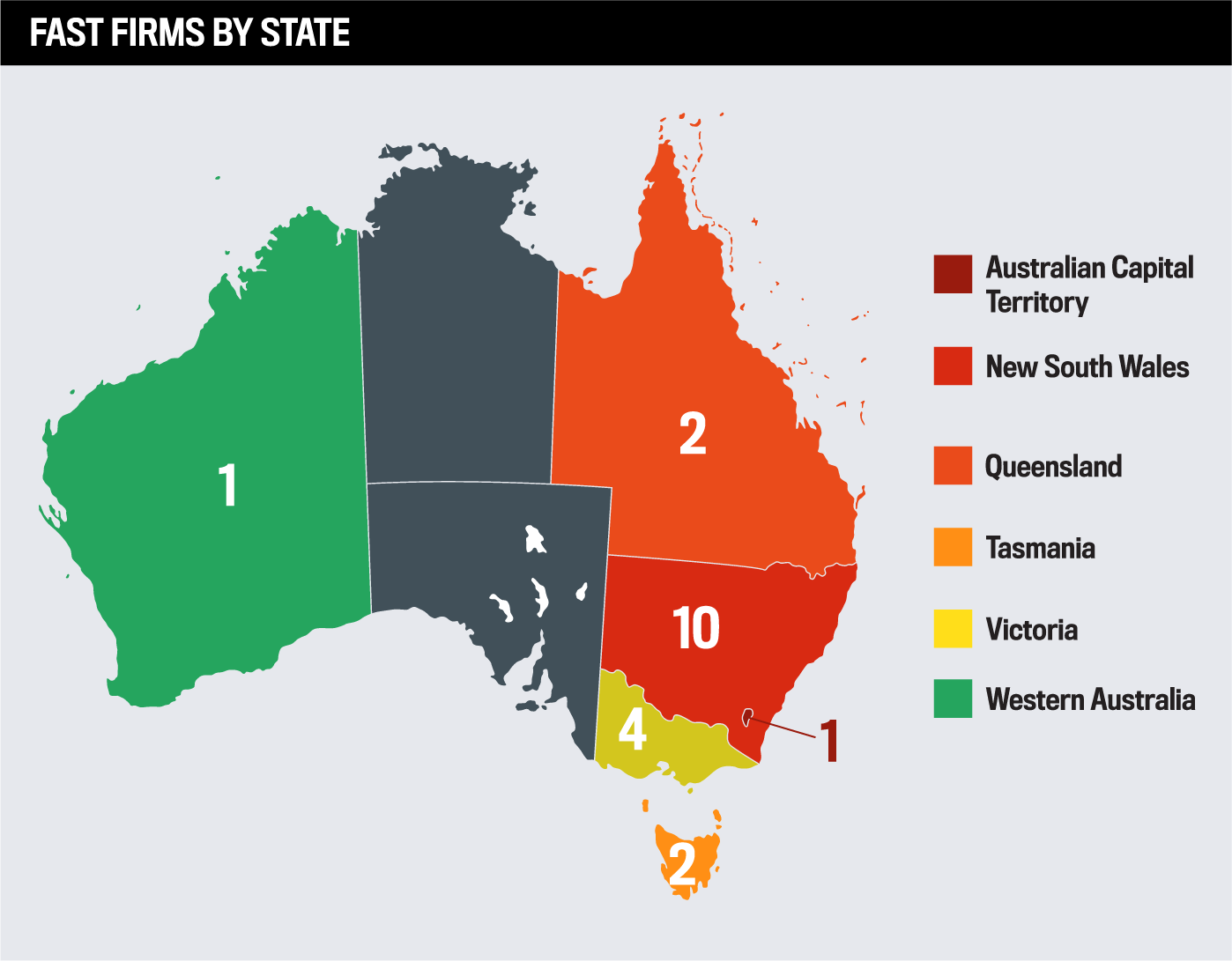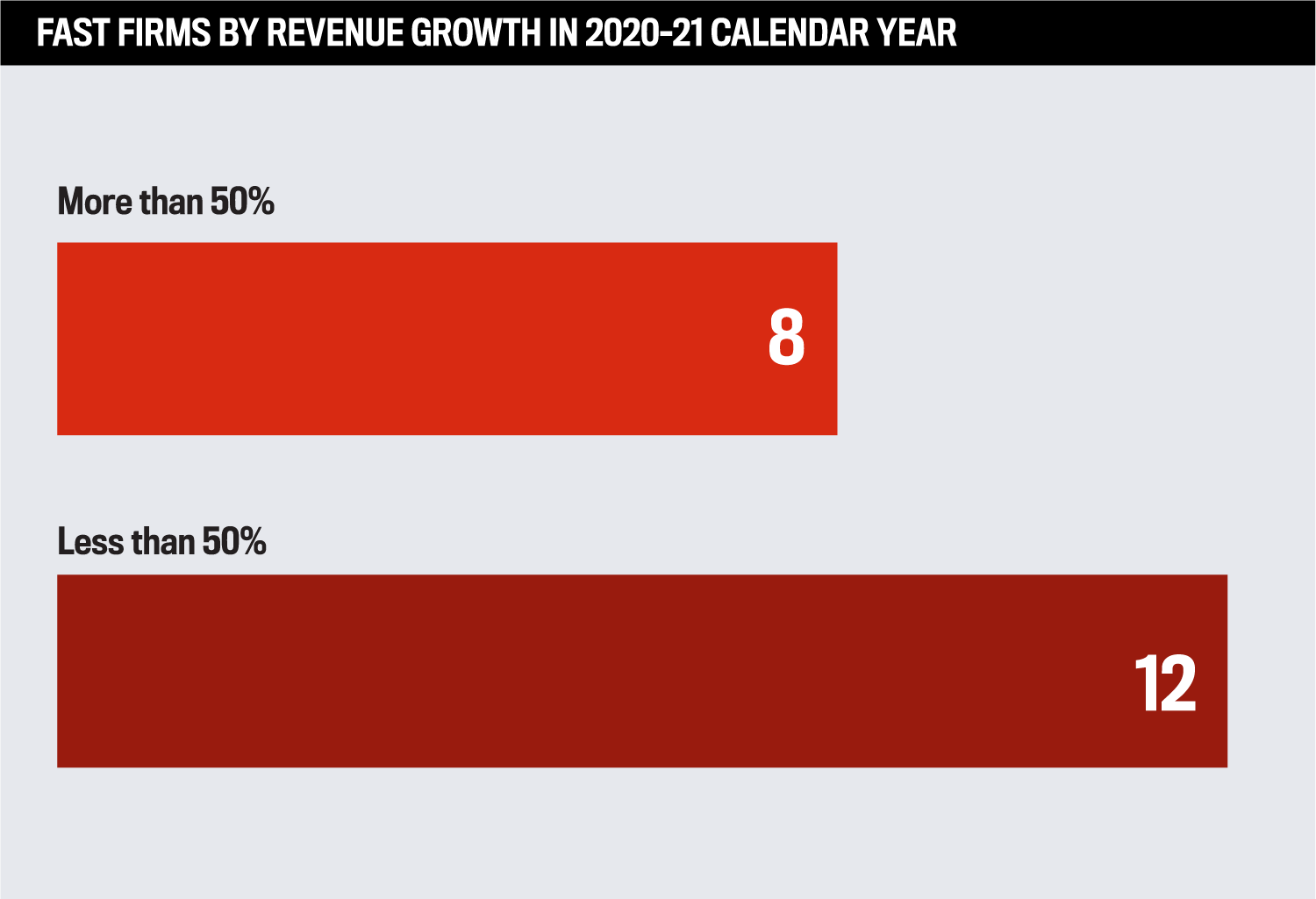

Jump to winners | Jump to methodology
The Law Council of Australia’s president, Tass Liveris, stated that over the 2021–22 financial year, the pandemic “created new legal issues and needs while at the same time changing how legal services are provided”.
“Legal services around the world are facing new challenges, but our sector has shown itself to be resilient and adaptable,” he said.
Australasian Lawyer’s Fast Firms 2022 have capitalised on these market conditions, delivering growth both in revenue and headcount. They’ve built on their senior leadership teams and some have expanded their reach into new parts of the country.
“We stay close to our clients to anticipate their needs, building out our capacity to meet those needs”
Richard Wood, Gilchrist Connell
Firms even entered into strategic partnerships to broaden their offerings, and expressed their intentions to either deepen or explore their expertise in other practice areas.
Part of being a Fast Firm is having a blueprint, but also being alert enough to react to circumstances.
One winner, Gilchrist Connell, has seen 42% revenue growth, and managing principal Richard Wood says, “I would like to say it was all pre-planned, but I offer that anyone who says that in the present business landscape is telling lies. The market conditions we are working within now are, in my view, unprecedented.”
And he adds, “Certainly, there are areas where we have clearly set out with a plan to bolster our capability in key service lines, informed by client demand for those areas. Beyond this, opportunities have presented themselves where we have had to make a decision as to whether that opportunity was a good move for our firm.”

Staying aligned to core values is one strategy that has paid rich dividends for Kalus Kenny Intelex (KKI), another Fast Firm in 2022.
When asked about the reason for the firm's revenue growth over the past 12 months, partner Sven Burchartz says, “Sticking to what we do best – straightforward responsive advice to our clients that gives them insight as to why we are giving the advice and how it meets their objectives. In the end, it’s about people. We’re in the people and relationship business and what stands out here is that everyone takes pride and gets a kick out of doing a great job.”
However, like other law firms, KKI has a good grasp on being adaptable and versatile. “We also look for what the clients might need and then offer it to them. And if we don’t have it, we’ll build it,” adds Burchartz. “Our estates and wealth protection and family law practices grew out of this philosophy. And we made sure we kept our people safe, informed and supported.”
Gatehouse Legal Recruitment director and executive search consultant John Castello identified family law as a practice area that has been growing of late as a result of how domestic relationships have been affected by the pandemic. He also pointed out that low bank interest rates have bolstered demand for property law advice.
Activity in the corporate and commercial law expertise has also ticked upwards; this ties in with KKI’s focus on investment and finance.
“We see great opportunity in the investment and finance sector to build on the terrific work we’re doing for family offices, venture capital funds and the non-bank funding sector,” Burchartz says.
Meanwhile, Burgess Paluch Legal Recruitment director Doron Paluch highlighted insolvency law, technology, general litigation, employment law and insurance litigation as practice areas to focus on. Robert Walters legal manager Robert Kruger pointed to ESG disputes, construction and energy projects as areas with significant growth potential.
“Corporate M&A saw increased growth post-pandemic with market conditions favourable with [low] interest rates and a quieter period during 2020. [Front-end construction] practices have also grown significantly following a number of state-based and national infrastructure projects that were announced to stimulate the economy,” Kruger explains.
Regardless of the sector, growth was paramount for another Fast Firm winner, Paula Sutherland & Associates, who formed only two years ago.
Practice manager Allie Brown explains, “As it was a new business, growth was essential for its success and that was the biggest driver. There has been a lot of planning that was essential to growing the business, including in marketing and advertising, hiring of staff, adequate resourcing and training.”
“We see great opportunity in the investment and finance sector to build on the terrific work we’re doing for family offices, venture capital funds and the non-bank funding sector”
Sven Burchartz, Kalus Kenny Intelex
Driving growth is no simple process in the law profession. A key component is having enough lawyers — a major obstacle in a challenging recruitment market.
“Working in professional services, you can’t just push a button and produce more widgets,” explains Wood. “Growth for us must be balanced both in terms of increasing our share of our client’s legal work and increasing the number of lawyers we have to deliver that work. We stay close to our clients to anticipate their needs, building out our capacity to meet those needs.”
Since January 2021, Gilchrist Connell has increased the number of lawyers under its banner by 54%. The firm continues to recruit 6–7 lawyers per month, along with non-fee earning roles to support revenue growth at 12% (2020), 13% (2021) and 14% (2022).
Wood reveals that his firm’s successful recruitment is powered by more than attractive pay cheques.
“This ability to secure candidates ahead of our competitors is based on our culture, our commitment to the further development of our people and the opportunities we offer. We have discovered that while salary is important, and we do pay well, it certainly isn’t necessarily the most important issue,” he says.
“As we continue to grow, so too have our benefits offered to employees, including flexible working arrangements for work-life balance, market-leading health and wellbeing services including mental health support, extra leave, reward travel, in addition to our discretionary bonus scheme which all employees are eligible for.”
Another side of the coin is how firms seek to bolster staff retention by providing opportunities for advancement.
“We try and make sure that everyone has a path to progress if that’s what they want or otherwise, if they have other objectives, we’ll accommodate that as well,” Burchartz says.
KKI believes that work comes along naturally when firms prioritise cultivating staff who are focused and motivated.
“The people we work for or [give us referrals] also see this and the energy and commitment, and they seek us out for it,” Burchartz notes.
“Adding to the depth of what we already do is the priority. We know who we are, what clients we have and want to work for and recognise that to be relevant, we must be at the top of our game.”
He adds that KKI is always on the lookout for legal talent and has grown its fee-earning staff, outside of partners, by 60%. In the past 18 months, the firm has also increased its client numbers, particularly in the commercial and corporate, structured finance and construction practice areas.
“We’re always looking to get talented people to join us and even if we don’t necessarily have a spot for them, we’ll back the right people to work with us to create something,” Burchartz explains.
Castello points out that with the legal market for talent being “the most competitive we have seen in it in over a decade,” firms need to be strategic in how they attract new lawyers.
“Firms need to avoid going to market and positioning an opportunity one way with candidates, and then re-engaging the market 12 months later and positioning the opportunity as something else, as you simply do not get a second chance to make a first impression with the best legal talent in this market,” he shares.
For Paluch, culture always needs to be front of mind for firms to both hold on to and draw legal superstars.
“Lawyers want to see good leadership, and they want to see a good, strong, firm culture as well as good mentoring for junior lawyers and a good future outlook for senior lawyers,” he says.
“You can have the best brand, the best clients and the best legal work in the market, but without the best legal talent, you are not going to grow”
John Castello, Gatehouse Legal Recruitment

One of the Fast Firms, Jewell Hancock Employment Lawyers, invested in cloud-based tech to be more efficient and make their services more cost-effective for clients. Also adopting the cutting-edge approach is fellow winner Chamberlains, who recorded a 48% revenue growth and developed the third generation of their online wills platform. The firm serves clients in the gap between those who need a will and those who can afford expensive professional services.
This tech-driven approach chimes in with the views of Alex Gotch, director at Beacon Legal, a firm that was not part of Australasian Lawyer’s survey. He says, “The technology sector is an area where in Australia a lot of investment is being made, so I think it will be a strong growth sector in the next few years.”
Paluch also sees a bright future ahead for the legal profession.
“Everything is cyclical, and you would imagine that the current rate of activity will not continue as it is,” he explains. “[But] even if there are some areas that might slow down, others will pick up at the same time… we would expect to see law firm activity continue at a good rate.”
Meanwhile, Kruger advises smaller firms to take advantage of opportunities to raise their profiles via the media, which could attract high-level talent like partners from large firms. He also believes that another way for firms to sustain growth is by expanding on how lawyers work.
“One approach growing firms should be looking at is incorporating business development for all lawyer KPIs instead of just billable targets for chargeable work to ensure their continued growth,” he explains. “It ensures work continues to flow in, enables the firm to grow in resources and in turn [remunerate staff] accordingly.”
Castello is clear on his advice to those keen to emulate the 2022 Fast Firms.
“I would recommend a law firm looking to grow in Australia to invest time to develop their unique employee value proposition first before going to market, as you can have the best brand, the best clients and the best legal work in the market, but without the best legal talent, you are not going to grow,” he says.
Australasian Lawyer launched the nominations period for the 2022 Fast Firms report on 20 June in line with the publication’s goal to recognise the fastest-growing law firms in Australia.
The research team asked firms to list their revenue and headcount figures for the 2020 and 2021 calendar years, in addition to other growth milestones they wanted to highlight. Global firms were instructed to focus only on the figures related to their Australian operations.
The Australasian Lawyer team then evaluated the nominations received to identify the firms that experienced standout growth in terms of revenue, partnership headcount, general headcount and progress of expansion.
A total of 20 firms made the final list, including small boutiques and big global firms. These firms confirmed their resilience and cemented their strong positions in the Australian legal market.
10 of the Fast Firms reported growing their partnerships over 2021–22
3 logged triple-digit or higher growth revenue over the 2020–21 calendar year
4 are based in Victoria